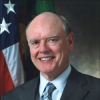John W. Snow

John W. Snow
John William Snowwas the CEO of CSX Corporation, and served as the 73rd United States Secretary of the Treasury under U.S. President George W. Bush. He replaced Secretary Paul O'Neill on February 3, 2003 and was succeeded by Henry Paulson on July 3, 2006, in a move that had been anticipated. Snow submitted a letter of resignation on May 30, 2006, effective "after an orderly transition period for my successor." Snow announced on June 29, 2006 that he had completed...
NationalityAmerican
ProfessionEconomist
Date of Birth2 August 1939
CountryUnited States of America
Well, I think the global economy is in the position for continuing good growth with inflation well in check.
And one of our points of continuing conversation with our trading partners is the urgency of their taking steps to remove barriers to their improved growth performance.
Everybody you talk to about insurance says the insurance market has become a lot more vibrant as a result of lifting, allowing the foreign direct investment.
And I think the American people look to the leaders to lead. They look to the leaders to take on the big problems. And the president deserves a lot of credit for doing that.
Higher energy prices act like a tax. They reduce the disposable income people have available for other things after they've paid their energy bills.
We must start with the reality that corporations cannot guarantee anyone a lifetime job any more than corporations have a guarantee of immortality.
Our view is that economic isolationism is the wrong way to go. Vibrant, successful growing economies that advance the interests of their citizens engage the global economy. And, we're committed to engaging the global economy.
Telecom is a dramatic success in India and our view is, respecting the political process, and respecting the fact that these are sovereign decisions, is that, approaching India as a friend.
I think we'll build a consensus for action on Social Security reform which will reduce that long-term unfunded obligation and put the system on a sustainable basis.
We promote domestic savings by also things like the personal accounts associated with the president's Social Security initiative, which over time would generate more savings.
Higher energy prices act like a tax.
We have the deepest and most liquid capital markets in the world.
Well, I make a practice of not commenting on the role of the relative exchange value of our currency.
We have a serious structural deficit problem. And it needs to be addressed. The president is trying to address it through reforms of Social Security, but the problem is there with other entitlement programs like Medicare and Medicaid.